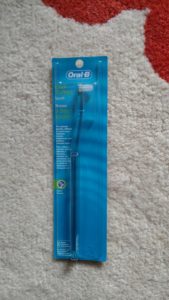Welcome to Word Matters!
 In my medicine cabinet, alongside my regular toothbrush, I keep a special “end-tufted brush,” good for focusing gently on my gumline and the backs of my front teeth. I recently found myself looking at the packaging and finding that the name in French is “brosse à bout touffu”. Which is to say, “brush, at the end, tofu” – or…well, something like that.
In my medicine cabinet, alongside my regular toothbrush, I keep a special “end-tufted brush,” good for focusing gently on my gumline and the backs of my front teeth. I recently found myself looking at the packaging and finding that the name in French is “brosse à bout touffu”. Which is to say, “brush, at the end, tofu” – or…well, something like that.
Anyway, while looking at the French name of my special toothbrush*, I noticed the phrase “à bout” and how similar it was to the word “about”. I found myself wondering whether it might be cognate or share history with the English word. In a sort of “what is this story really about, in the end?” way.
So I looked up the etymology of “about” and learned the following:
from Merriam-Webster’s Third New International Dictionary (NI3):
Middle English abuten, aboute, going back to Old English abūtan, abūton, from a- + būtan “outside, without” –More at but
from Online Etymology Dictionary
Middle English aboute, from Old English abutan, earlier onbutan “on the outside of; around the circumference of, enveloping; in the vicinity of, near; hither and thither, from place to place,” also “with a rotating or spinning motion,” in late Old English “near in time, number, degree, etc., approximately;” a compound or contraction of on + be “by” + utan “outside.”
By c. 1300 it had developed senses of “around, in a circular course, round and round; on every side, so as to surround; in every direction;” also “engaged in” (Wist ye not that I must be about my Father’s business?), and gradually it forced out Old English ymbe, ymbutan (see ambi-) in the sense “round about, in the neighborhood of.”
In other words, “about” descends from words and roots that mean around, or outside of a center. Physically, I can picture this: a room, for example, with chairs scattered about.
Meanwhile, my searches online and in my little French-English dictionary tell me that “à bout” is “at the end” or “to the limit”. And “bout” itself translates to “end, tip, butt, stub”.
So, as it turns out, I’m wrong about about**. I was thinking that the focus of a story, what it’s about, might be something you’d end up with. Instead, the story centers around, or about, that focus. But I learned some things. And I have a new picture in my head, of a story gathering, or maybe dancing, around its focus. And I love that moment of wonder, when I sense a connection between or among words, and new worlds of possibility and imagery open up in my view. That moment, with the exploration that follows, is one of the foci of this blog.
About this blog
I am
(nouns): parent, writer, editor, singer, songwriter, lesbian, reader, feminist, linguist
(adjectives): female, Jewish, secular, white, left-handed, cisgender, Ashkenazi, American
I love
cats, music, chocolate, language, the woods, the city, puns, working toward peace and justice***
I write about
word origins and history. False cognates, true cognates. Language development and parenting. National politics and identity politics. Framing of arguments. Books and songs. Punctuation and pragmatics. The occasional grammar guide. Truth in advertising. The power of words to separate, or denigrate, or accord new respect. Dialect differences and language change.
*which I highly recommend, by the way, if you tend to get tartar in specific places. Hat tip to Terry, my dental hygienist!
** with the following two notes:
1) It’s kind of funny that “about” means encircled and close by, while “à bout” means to the farthest limit.
2) It’s also funny that “about” is related to “but,” while “à bout” is related to “butt”. False cognates indeed!
***Plus some other stuff. Here’s what I said I love when I was 13 and introducing myself to my diary: “reading, writing, singing, cats, unicorns, mythology, science-fiction, all animals that aren’t cats or unicorns, life, puns and other jokes, Doctor Who, other British humor, talking, chocolate, other food, being extremely weird, gymnastics, swimming, most of school, traveling, the idea of World Peace, nature, enjoying myself, and getting along with other people.” I’ve clearly changed some since then, in that … I don’t so much do gymnastics anymore. (Also, I have taken the liberty of adding a comma between “cats” and “unicorns,” as I’m fairly certain I meant to have one there.)